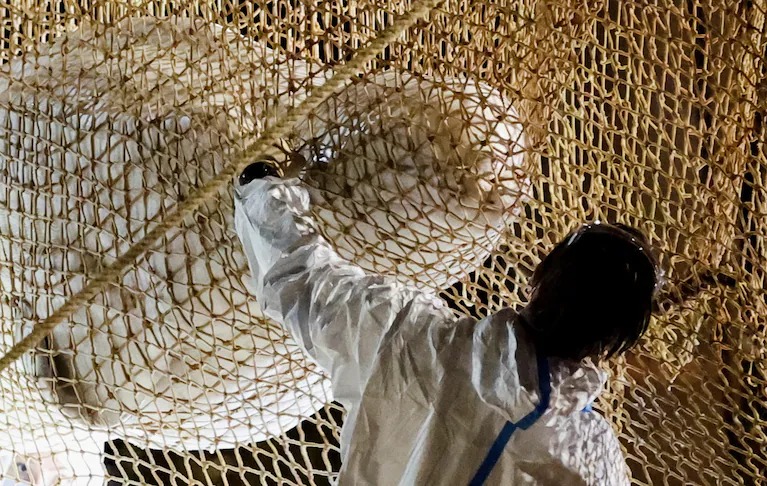
Officials have verified that a beluga whale rescued after being stranded in France’s Seine River for more than a week perished while on its way to the sea.
Since August 2, the whale has been trapped in the freshwater lock at St.-Pierre-La-Garenne, 45 miles northwest of Paris. According to wildlife conservation organizations monitoring the situation, its health deteriorated when it refused nourishment.
On August 10, 2022, firefighters and members of a search and rescue squad draw up a net to save a beluga whale that had wandered into France’s Seine River.
According to Reuters, it took more than 80 rescue personnel six hours to release the animal from the lock, following which it was transported on a barge and subjected to medical examinations.

Scientists were concerned about the animal’s “alarming” weight loss and had to euthanize it shortly after. Officials from the Essonne Department Fire and Rescue Service announced its death in a video message.
“During the trip, the veterinarians noticed a deterioration in its condition, particularly in its respiratory activity, and we were able to see that the animal was in anoxia — ie, inadequately ventilated — so this animal was obviously suffering and we decided that it was pointless to release it and so we had to proceed with its euthanasia,” Florence Ollivet-Courtois, veterinarian at the fire and rescue service, said.
Vets had hoped that the whale may be brought to Normandy and eventually released into the sea.
It weighted roughly 800 kilograms (1,764 pounds) but should have weighed around 1,200 kilos, according to Reuters (2,646 pounds).
The Arctic and sub-Arctic areas are the beluga’s native habitat. Although the best-known population is situated in the St. Lawrence estuary in Quebec, Canada, the population closest to the French coast is in Svalbard, a Norwegian island 1,900 miles from the Seine.

No one knows how the beluga got lost, but according to WWF, sea ice loss in Arctic areas is allowing more shipping, fishing, and other human activity, impairing the whales’ ability to communicate and navigate. Finding food and mates is also getting increasingly challenging for the species.
Many marine mammal species have been detected in France in recent years, far from their natural home. According to France’s Pelagis Observatory, which specializes in the study of sea mammals, possible factors include health state, age, social isolation, and environmental circumstances, among others.

Leave a Reply